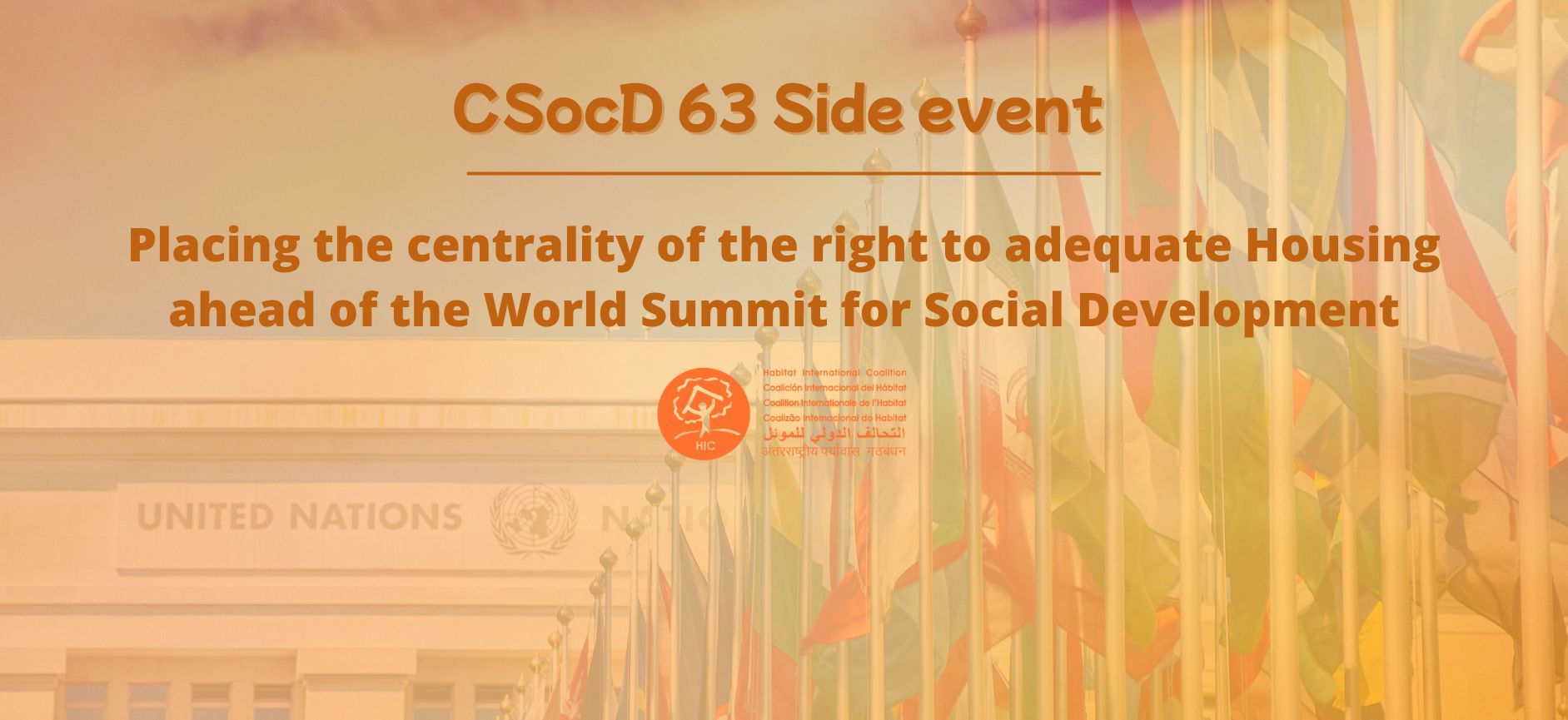At the German Internationalist Conference BUKO, May 9-12 in Dortmund, we are now offering two workshops and a networking meeting. Su 10:00 – 11:30 a.m. and 12:00 – 1:30 p.m Su 3:00 p.m. Networking Meeting Theme: Global Social Rights Worldwide more than 1 billion people are living under conditions which, following the criterions of the UN, are not decent. They are living in the streets, in close and miserable informal settlements, without water and sanitation supply, without protection against evictions. And daily they are becoming more. In the global competition for investors, prosperous residents and tourists, the poor and lower income populations are under pressure. Especially in economically booming cities popular neighbourhoods get cleared for office buildings, hotels, shopping malls, roads, industrial plants and gated communities of the upper middle classes. Mega-events such as Olympics and football World Cups are working as engines of this type of modernization, which everywhere is bulldozing the habitats of the poor. In successful metropolises of the world market like New York, London, This injustice worldwide mobilizes residents and solidarity movements in the fight for safe and better living conditions. In many countries – and partly even internationally – they gather under slogans such as the “right to housing”. In their struggles for the recognition and defence, the implementation and the reclaiming of their rights these movements even can rely on international human rights. However, at the same time these human rights – as well as all national and international regulations, institutions and programmes – are battle fields in which different interests and strategies clash. Which opportunities do we have for making the “right to housing” a movement against the hegemony of neoliberal globalization? In this workshop we are trying to find practical approaches to the issues of international housing rights struggles at the basis of current examples. In the first part Klaus Teschner and Knut Unger will report from recent slum struggles in Nairobi, from the displacement of poor residents for the football World Cup in Cape Town, about the demolition of large urban redevelopment areas in Istanbul, from successful approaches against housing privatisations in the Ruhr area and from the exemplary struggles of the squatter and tenant movement MOI in Buenos Aires, which transformed vacant houses and factories in affordable and decent collective housing. In the centre of the discussion is the attempt to identify international relations in these struggles. In the second part, we welcome representatives of the Paris movement JEUDI NOIR. They will report from their actions in the metropolis of the housing crisis: the housing survey parties, the squats and street occupations, the successful mobilization of the public, the reactions of state power and jointly won successes. What are the prospects for a Europeanization of housing struggles which may arise from these and other local experience? Klaus Teschner (Misereor, TRIALOG), Knut Unger (Habitat NET, Witten Tenants Association ), Martin Krämer (Ruhr Tenants Forum) and guests from Paris and Venezuela *** Su 3:00 p.m. Hundreds of thousands of tenants in Germany after the sale waves of recent years have international financial investors as a landlords. At the other hand, major German banks are directly engaged in destructive real estate speculation and large investments in the United States and many other countries.You can list many more “global” determinants for housing and cities: The decades of deregulation and privatization, the triumphant “innovative financial products” such as REITs or securitisation, special economic zones, the global retail sector, the internationalized competition, the competition policy of the EU Commission … Despite huge differences local social movements across the world face similar questions: However, from the more or less developed awareness about the problem (and from the alter-globalization rhetorics) it is a long way to go to internationalist practices. Housing and urban struggles are the direct expression of everyday and survival interests, which cannot be ignored by claiming a need for global struggles. And finally, local grass-roots movements are not built by intellectuals who are able to communicate or even travel around the world. Especially in Germany the international exchange of local social movements and urban organizations is underdeveloped. Can we imagine practicable projects to overcome these deficits? Based on experiences with networking of housing and urban groups we want to brainstorm what we can do together. Habitat Net – Ruhr Tenants Forum – Project “Reclaiming Spaces” To see all the workshops, just clik here
Housing Struggles and neo-liberal Globalization with guests from JEUDI NOIR, Paris
Towards an internationalization of urban and housing struggles.
Su 10:00 – 11:30 a.m. and 12:00 – 1:30 p.m
Housing Struggles and neo-liberal Globalization
Paris or Barcelona housing for workers in the financial and entertainment sector became unaffordable. Public housing, land markets and infrastructure have long been in the mills of international financial speculation. As a consequence of the burst of the speculative housing bubbles, countless additional homeless are on the road in the U.S.
Networking Meeting
Towards an internationalization of urban and housing struggles?
How can we achieve successes if the local opportunities for social developments and emancipative changes get ever closer and if the central decisions are made by global financial investors ? How can we overcome helpless local and national defense struggles and proceed to new offensives? How can we move into confrontation with the forces of economic globalization without loosing our local rooting?
CSocD 63 Evento paralelo : Situar el derecho a una vivienda adecuada en el centro de la Cumbre Mundial sobre Desarrollo Social
Antecedentes Asistimos hoy a una crisis mundial de la vivienda, marcada por un escenario de empeoramiento general de las condiciones de asequibilidad, creciente financiarización y especulación de la vivienda, desahucios [...]
